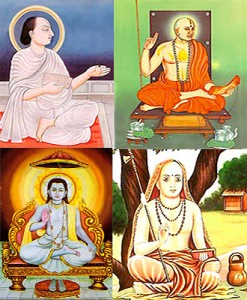 Vedanta Philosophy refers to one of the six schools of orthodox Indian darshanas (viewpoints, ways of seeing), which received its first systematic formulation and development by Adi Sankaracarya (8th century CE). Vedanta is grounded in the prasthana-traya: the three-fold scriptural canon of the Upanishads, Bhagavad Gita, and Brahma Sutras. From the perspective of this textual tradition and its closely-allied spiritual practices, Vedanta aims to illuminate the transcendental and hence eternal features of the cosmos and human experience, as well as to systematically articulate this darshan of the ultimately real behind the appearances of the material world. It describes this ultimate reality as sat-chit-ananda (being-consciousness-bliss) and gives it the name Brahman. So Vedanta is inquiry into Brahman, with the ultimate interest of Brahman realization: the transformation of the self into union (yoga) with Brahman. Many of the schools of devotional theism in India are rooted in or draw on Vedanta philosophy.
Vedanta Philosophy refers to one of the six schools of orthodox Indian darshanas (viewpoints, ways of seeing), which received its first systematic formulation and development by Adi Sankaracarya (8th century CE). Vedanta is grounded in the prasthana-traya: the three-fold scriptural canon of the Upanishads, Bhagavad Gita, and Brahma Sutras. From the perspective of this textual tradition and its closely-allied spiritual practices, Vedanta aims to illuminate the transcendental and hence eternal features of the cosmos and human experience, as well as to systematically articulate this darshan of the ultimately real behind the appearances of the material world. It describes this ultimate reality as sat-chit-ananda (being-consciousness-bliss) and gives it the name Brahman. So Vedanta is inquiry into Brahman, with the ultimate interest of Brahman realization: the transformation of the self into union (yoga) with Brahman. Many of the schools of devotional theism in India are rooted in or draw on Vedanta philosophy.
Featured Article: Edwin Bryant, “Inside the Vedanta Tradition.”
 Follow
Follow